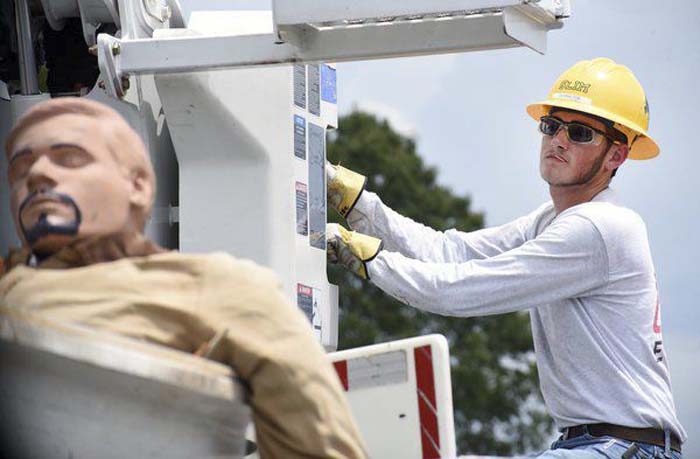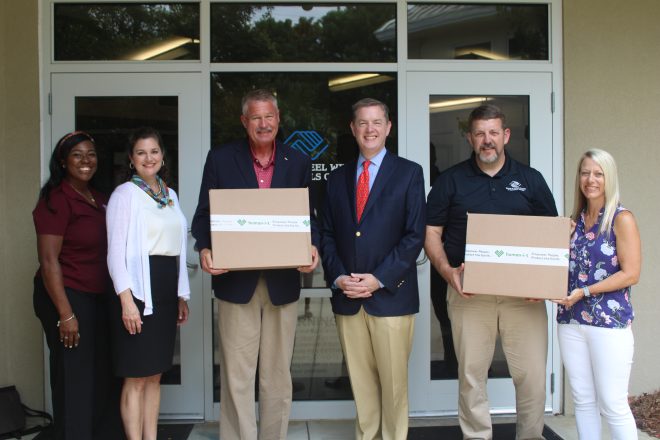Tunnel Hill school preparing students to work as electric linemen
Published 6:00 am Monday, July 29, 2019

- Matt Hamilton/Daily Citizen-NewsClarke Poe practices a rescue using a bucket truck and a dummy at the Elite Lineman Training Institute in Tunnel Hill.
TUNNEL HILL, Ga. — When the winds are blowing, electric linemen go to work. In bitter cold or staggering heat, electric linemen go to work. Late when the rest of us are sleeping, and on the weekends when many of us are relaxing, electric linemen go to work.
“There’s a real brotherhood among linemen, and a real pride that we do a job that most people can’t do,” said Waylon Hasty, founder and lead trainer of the Elite Lineman Training Institute in Tunnel Hill.
Hasty, a graduate of Northwest Whitfield High School, spent 15 years as a lineman and crew leader for Georgia Power before starting his firm.
“I started in 2004 in Ellijay (as an apprentice),” he said. “For about three or three-and-a-half years, I spent the majority of my time between Ellijay, Dalton and Rome. I made lineman in 2008. At that point, my career moved to metro Atlanta. I still lived in this area and drove there. In 2011, I interviewed for my first leadership job as a crew leader and was made a crew leader in Trenton. In 2016 I returned to Alpharetta (as a crew leader). I had a good career with a great company.”
But he says he felt God was leading him in another direction, to work with and mentor youth. That’s how he came up with the idea for the Elite Lineman Training Institute.
“The reason there’s a need for us is that there’s an 80 percent turnover in the first 18 months of being hired (as a lineman),” he said. “Young men say ‘I want to make a lot of money.’ But then they see how demanding the job can be. For the employers, we are basically a vetting process. They know our graduates aren’t afraid of heights. They know our graduates know the physical demands of the job. They know they have been out there in the summer heat working, so the employer gets a better return on its hire.”
Before Hasty could start his school he had to demonstrate there was a demand for the training he would provide to the Georgia Nonpublic Postsecondary Education Commission, which regulates nonpublic schools operating or offering instruction in Georgia.
“They were very supportive, but they also have a lot of regulations that have to be met,” he said.
Hasty is quick to note that completing the school’s 12-week program will not make graduates a lineman.
“That’s a long process, a four- or five-year process,” he said. “We try to prepare them to get them onto that path. When they graduate, they are certified in first aid, CPR and AED (automated external defibrillator). They are certified traffic flaggers. They have a Class-A CDL (commercial driver’s license) learner’s permit. They are certified pole top rescue and bucket truck rescue. They have an OSHA (federal Occupational Safety and Health Administration) 10-hour electrical transmission and distribution certification.”
Tuition for the 12-week pre-apprenticeship program is $9,800.
“As part of their tuition, they are outfitted with everything they need: hardhat, safety glasses, gloves, climbing boots, climbing tools, belt, hand tools,” Hasty said.
He said graduates who are hired by a utility can expect to start out working at $17 to $22 an hour depending on the part of the country they go to.
Dalton native Jarrod Farmer said he’d been a rafting guide and worked in construction and for a trucking company before hearing about the Elite Lineman Training Institute. He praises the school for emphasizing not only the technical aspects of the job but “soft skills” as well.
“Learning what to do during an interview and how to present yourself will not only help in getting a job as an apprentice or a groundsman but even more so down the road when you are looking at getting a leadership role or going into safety,” he said.
Nick Curtis came to the school from Nashville, Tennessee.
“I like working outdoors. I like being hands on. I worked in an office for about two years and found that wasn’t for me,” he said. “This is above and beyond what I expected. I believe I’ll be able to get a job.”
Hasty said he is very pleased with his first class of seven students and is already planning future classes.
“To date, everything has gone as planned. It has been phenomenal,” he said.





